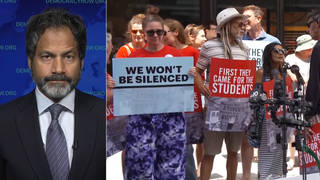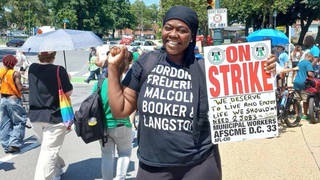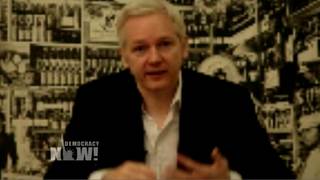
In a holiday special, we feature an exclusive Democracy Now! interview with WikiLeaks founder Julian Assange. In July, Amy Goodman spoke to Assange after he had just entered his third year inside Ecuador’s embassy in London, where he has political asylum. He faces investigations in both Sweden and the United States. In the United States, a secret grand jury is investigating WikiLeaks for its role in publishing a trove of leaked documents about the Iraq and Afghanistan wars, as well as State Department cables. In Sweden, he is wanted for questioning on allegations of sexual misconduct, though no charges have been filed. During his interview, Assange talked about his new book, which at that time had not yet been released, titled, “When Google Met Wikileaks.” The book was later published in September.
Transcript
AMY GOODMAN: In this holiday special, we begin with an exclusive Democracy Now! interview with WikiLeaks founder Julian Assange. In July, I interviewed Julian Assange after he just entered his third year inside Ecuador’s Embassy in London, where he has political asylum. He faces investigations in both Sweden and the United States. In the U.S., a secret grand jury is investigating WikiLeaks for its role in publishing a trove of leaked documents about the Iraq and Afghanistan wars, as well as State Department cables. In Sweden, he’s wanted for questioning on allegations of sexual misconduct, though no charges have ever been filed.
During his interview, Julian Assange talked about his new book, which had not yet been released when I was in the embassy with him. It’s called When Google Met WikiLeaks. The book was published in September. I began by asking Julian Assange to explain the book’s title.
JULIAN ASSANGE: The title of the book is When Google Met WikiLeaks. And so, that’s the interesting thing: Did Google ever meet WikiLeaks? OK, both—lots of people have heard of both of these institutions, and in some ways they seem very different, in some ways they seem quite similar. Both are involved in, it seems, spreading information around the world, across borders, and also collecting information.
Eric Schmidt, the now chairman of Google, came to visit me under house arrest, secretly, in 2011. And the—
AMY GOODMAN: When you were under house arrest in Britain?
JULIAN ASSANGE: When I was under house arrest in the U.K., in fact, rural U.K., quite isolated, our location. And he had a party of three other people that came with him. Now, the reason or pretext for that visit was that Eric Schmidt was working on a book, and the book was called The New Digital Age. In fact that book was eventually published last year. It wasn’t—and is an interesting book to read to sort of understand where Google wants to position itself in terms of the Washington establishment. To sum it up, The New Digital Age, that book by Eric Schmidt, is Google’s call to Washington to represent itself as America’s geopolitical visionary. So, as far as geopolitics is concerned and where it’s going and its integration with technology and the Internet as a global structure, Google has the answers, and Google can explain how to get there. Now, that was the outcome.
Who else came to the party back in 2011? It wasn’t just Eric Schmidt who came to see me. He had a retinue of three people. And those were Jared Cohen, Lisa Shields and Scott Malcomson. Now, I didn’t really think about that visit and the other people who came to see me for this interview until much later, until we were publishing State Department cables and, in fact, were going to publish a lot of State Department cables back in September 2011. And for various legal reasons, we needed to document that I had tried to make a telephone call to Hillary Clinton. And so, having been at this game for a while as a journalist, this is how you get to someone who’s in an influential position of power. You say, “There’s a person-to-person call from Julian Assange to Hillary Clinton.” You get one of your people to do it, say, “I am Julian Assange’s PA,” and gradually you rise up the levels of the bureaucracy. And so, we did that with Hillary, went in through the front door, and after, you know, some minutes, I got up to her senior legal adviser, who said that she was in a meeting and that they would call back.
And then we did get a call back, but it wasn’t by Hillary Clinton. It wasn’t by, at least initially, by anyone from the State Department. It was by Lisa Shields, the person who had come with Eric Schmidt, who was, in fact, at that time, Eric Schmidt’s girlfriend. So, Lisa Shields was used as a back channel by Hillary Clinton to check that it really was me that was trying to communicate with her. And that back channel turnaround happened in half an hour. So, at that moment, we came to understand that the chairman of Google was in fact very close to the State Department. In fact, he was literally sharing the bed, in some way, with the State Department.
AMY GOODMAN: Because Lisa Shields worked in the State Department?
JULIAN ASSANGE: Lisa Shields didn’t work in the State Department. Lisa Shields is the head of communications for the Council for Foreign Relations, which is kind of close to the State Department but doesn’t—she doesn’t formally work for the State Department. So this is a very informal thing.
So, who else was in that party? What were they about? Well, there’s Jared Cohen. Now, it turns out that Jared Cohen, who is the co-author of that book with Eric Schmidt, The New Digital Age, he had immediately worked for Hillary, just months, in fact, before coming to see me. He had previously worked for Susan Rice in the State Department, and he’d been an adviser. And he had made a transition straight out of the State Department into Google with Eric Schmidt. What did Eric Schmidt do with him? They met in 2009 in Baghdad, sort of looking at the ruins of Baghdad together. Eric Schmidt constructed, within Google, a sort of mini State Department. And that little mini State Department is called Google Ideas. And he made Jared Cohen the head of Google Ideas. And then, so the question is: What does Google Ideas do? What does Jared Cohen do? What sort of functions does it have? And I investigate that and those documents in the book.
The other person, Scott Malcolmson, was meant to be the editor for Eric Schmidt, the chairman of Google’s book. So, Scott Malcomson, just three months after he came to see me, went to work for the U.S. ambassador to the U.N., who has now become the head of the National Security Council. So, here we see, at a—
AMY GOODMAN: Susan Rice.
JULIAN ASSANGE: Susan Rice. Here we see, at a very close, intimate, personal level the interconnections between the chairman of Google and the U.S. State Department. And that’s not a—by itself, that doesn’t mean much. By itself, that is something that’s very interesting and draws your attention and curiosity. But then, when you see, well, what do these people do, what are their backgrounds, how are they connected together, what other sorts of institutions is Eric Schmidt involved in, where is his sort of center of gravity politically, and how much is that influencing Google, then that becomes more alarming.
And we can sort of sum it up that Eric Schmidt, the chairman of Google, is an extreme centrist. So he is part of this New America Foundation, which he has been for several years, and that sort of really represents his worldview. He’s very much part of what we would call family America. And that centrism, which is most closely affiliated, I suppose, with Barack Obama and Hillary Clinton, somewhere between this nexus, Google itself has adopted this centrism through Eric Schmidt. And that’s important.
And the reason it’s important is because Google has become so powerful. Google now has about 50,000 employees. Its market capitalization is around $400 billion. But 80 percent of the telephone—80 percent of the smartphones now being sold run something called Android, which is Google’s operating system. Knows when people have turned it on for the first time, their locations, the Wi-Fi networks that are within the area, everything they search through, the various ads that people see, which are also run by Google, emails that are in relation to Gmail.
So, Google is a, in itself, a type of private National Security Agency. It’s in the business of collecting as much data around the world as possible, about as much people and places as it can, making interconnections between this data in order to make people more predictable, in order, partly, to sell them advertisements. That’s its business model. But also it has become a target for the National Security Agency. And that is what has come out in the Edward Snowden revelations, that Google and the National Security Agency, through this PRISM system and several other involvements, have a close interaction. And that is what I study in this book, and also the interactions that Eric Schmidt and his team had with me and my team during that period of time in 2011.
AMY GOODMAN: What about what you believe, and what’s come out in these latest documents, not to mention perhaps ones that came out in documents you released, about Google, Facebook, other, you know, global digital companies participating with, not just being undermined by U.S. surveillance, sort of being unwitting partners, but willingly accepting what was happening, being part of the surveillance?
JULIAN ASSANGE: As is documented in When Google Met WikiLeaks, Google’s first known contractual interaction with the National Security Agency is back in 2003. The U.S. government lists Google as part of the defense industrial base. And so, it is something that is seen by U.S. hard power and surveillance power as something that is integral to U.S. strategic power.
And you can look at a number of different interactions that have occurred and how those PRISM revelations came out and some things that perhaps Google didn’t know about, but in the end, while Eric Schmidt’s personal influence and this extreme centrism that is politically in place in Google is interesting, we are left with, even if you had the best person running it, that we have a very powerful corporation that has spread itself into most of the world and is collecting information from people, from their handsets, from their searches and so on, pooling it in the United States, making interconnections, very sophisticated interconnections between all that information—basically doing all the National Security Agency’s job for it, erecting a central database, a rich central database.
And then all it requires is either coercive power to get that information out, which has been used a number of times, or bribes through government contracts or bribes even of just individuals who are in control of the information. So, Google itself, structurally, because of the nature of its business and how it is operating its business, is a dangerous entity that is very similar to the National Security Agency, that can be coerced by the National Security Agency into opening up its archives.
AMY GOODMAN: In some of the reporting, it sounds like Google and Facebook were used by the National Security Agency, almost hacked. What did they give over willingly?
JULIAN ASSANGE: You know, their involvement with the PRISM situation was a willing involvement, and their concealment of it. It’s quite hard to say what did an institution do willingly. The question is: What did Eric Schmidt do willingly? What did Sergey Brin and Larry Page do willingly? What did various engineers at Google do willingly?
If we look at cases like Verizon, where we can see that there’s been a number of interactions between Verizon and the National Security Agency, yes, Verizon did get FISA court orders to hand over all the call records on a continual basis to the National Security Agency via the FBI, but you can bet what actually happened was the head of Verizon, speaking at a sort of informal, social level with the National Security Agency, FBI, said, “Look, I really want to help you guys. I do. I want to help you. But I need to be protected. And therefore, you need to give me an instrument of force majeure, so I’m not sued by all the customers and shareholders if this thing comes out. Give me an instrument of force majeure. Give me some kind of thing from the FISA court, something like that, that I can cover myself, and then we let it go ahead.”
So, that seems to have happened in different ways within Google, not that there’s a tape recording of something going on like that. There isn’t, that we have. But if you look at a 10-year period of relationships between the National Security Agency and Google, and then the human relationships and meetings that have occurred with Eric Schmidt and General Keith Alexander, for example, then it starts to point to a cozy relationship and not an adversarial relationship. Google, as an institution, doesn’t want to be anyone’s victim. That doesn’t mean it doesn’t see itself, at the management level of Schmidt, as part of family America. Very frequently, Eric Schmidt uses the term “we.” And when you put in the context, what he’s talking about is the major power factions. “We want this. We want that. We think various things are bad.” So, it’s not like Google, at that level, sees itself as different to the U.S. government. It is part of the same establishment family within the U.S. And you can that also at the interpersonal level. And you can see that also at the interpersonal level when it comes to conveying information from Hillary Clinton to us.
AMY GOODMAN: So, Google, Facebook, have they been hurt by these revelations and, in terms of global competition, people moving away from these companies because they’re concerned that they are giving their information over to the U.S. government? And is it going to increase competition from global companies outside?
JULIAN ASSANGE: Their reputations have definitely been hurt. It would be interesting to see whether—you know, they’re companies that were growing very fast; Google doubled in its market capitalization between 2011 and 2014, from $200 billion to $400 billion—whether the constraint, the growth constraints applied by the damage to reputation of its complicity in mass spying are exceeded by the growth that it would have had anyway, because the growth it’s having anyway is extensive. But what it is generating is a circumstance where, you know, the Brazilians want to start their own email service, and they’re kind of giving lots of—or preparing to give lots of subsidies in relation to that. And similar with other organizations and in China, which has Baidu, which is a search rival to Google, which is dominant within China, that’s going to continue. Similarly, Russia has Yandex, which is a search rival to Google. Google has more penetration in Russia, but you can see, as a result of these revelations, that’s not going to erode.
AMY GOODMAN: Julian Assange, founder of WikiLeaks, speaking inside the Ecuadorean Embassy in July, talking about his new book, When Google Met WikiLeaks_. Visit our website, democracynow.org, to hear our full interview with Julian Assangeassange and all of our others inside the embassy, where he’s been holed up for almost three years. When we come back, we go back to London to speak with comedian Russell Brand.













Media Options